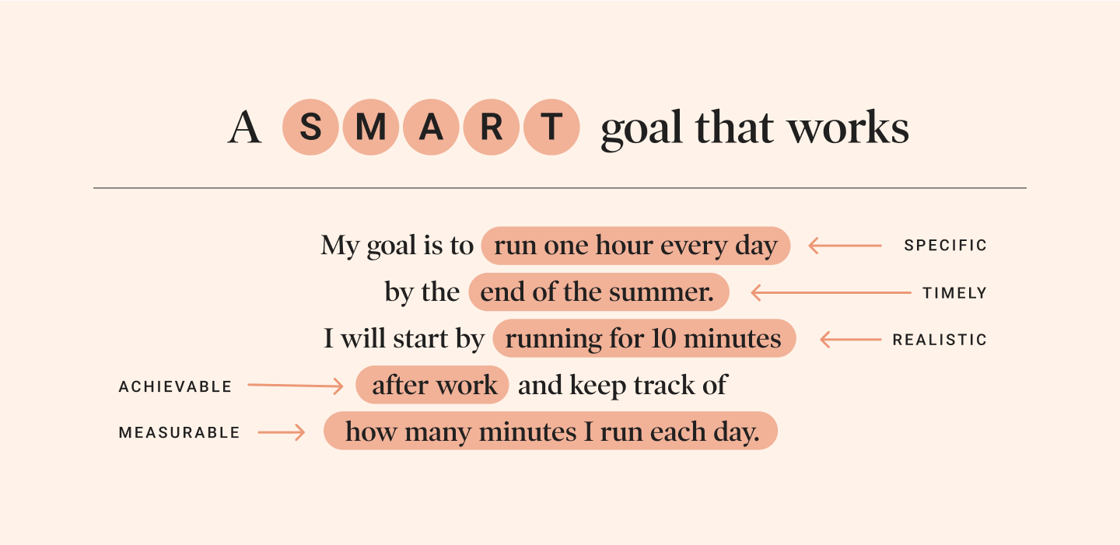Many of us think about tackling lofty goals, changing our habits, or prioritizing our well-being. Unfortunately, past failures and lack of structure can keep us from succeeding. An important key to setting and achieving goals is thoughtful planning. Without a plan that defines how you’ll improve yourself and measure your wins, it’s difficult to hold yourself accountable. By understanding the value of goal-setting and how to set yourself up for success, your next victory is within reach. Here’s how to set your goals and actually stick to them.
Why do we set goals?
Different people are driven by different emotions or ideas. There’s no right or wrong reason to set goals, as long as it compels you to accomplish yours sustainably. Here are some common reasons why we choose to set goals:
-
Improve health, relationships, or productivity
-
Effectively increase motivation
-
Achieve changes or life improvements
-
Create a sense of self-control
-
Maintain consistency
The benefits of setting goals
The road towards your objectives will likely have a few bumps along the way, but the journey still offers many benefits.
Dopamine boost
Dopamine is often referred to as the feel-good neurotransmitter. When you get what you want – whether it’s a new job or a new pair of shoes – your brain gives you a shot of dopamine, which creates a feeling of pleasure and reward. Working towards a goal and accomplishing it boosts your dopamine levels in a similar way. Each time your brain gets a hit of dopamine, it encourages you to repeat the corresponding behaviour. To keep the dopamine flowing, break down your goals into bite-sized, achievable pieces.
Improved performance
Research shows that setting goals can increase performance when:
-
You believe in the goal that is being set.
-
Your goal is specific and sufficiently challenging.
-
You have the ability to accomplish your goal.
-
You get feedback that shows progress.
Valuable experiences
According to Psychology Today, the practice of goal-setting provides you with valuable learning experiences. The opportunity to develop skills related to resourcefulness, resilience, forgiveness, and kindness can directly impact your well-being and happiness. Working towards and achieving goals can also give your self-esteem a boost, which improves overall mental health and life satisfaction.
How to set an achievable goal
Establishing SMART goals is a proven method of goal-setting. The process offers a set of parameters that helps you define your goal to improve your chances of success. It requires your goal to be Specific, Measurable, Achievable, Realistic, and Timely. Here are the building blocks of a SMART goal:
![]()
Specific
Be clear about what you’re aiming for. Your goals should include specifics, such as who, where, when, why, and what.
![]() I want to exercise more.
I want to exercise more.
![]() I want to improve my cardio to be able to run for one hour every day.
I want to improve my cardio to be able to run for one hour every day.
![]()
Measurable
Set goals that you can track. Your goals should include a quantity of how much or how many.
![]() I will run as much as possible.
I will run as much as possible.
![]() I will track how many minutes I run each day to measure my progress.
I will track how many minutes I run each day to measure my progress.
![]()
Achievable
Set goals that you can reasonably accomplish. Goals that are too difficult can be discouraging and could cause you to give up.
![]() I will run a marathon this year.
I will run a marathon this year.
![]() I will start by running for 10 minutes and work my way up to my goal of one hour.
I will start by running for 10 minutes and work my way up to my goal of one hour.
![]()
Realistic
Set objectives that are practical for your lifestyle, your resources, and your current circumstances. Ask yourself how this goal aligns with your day-to-day.
![]() My schedule is very busy, but I’ll make it work.
My schedule is very busy, but I’ll make it work.
![]() I have free time every day after work for exercise.
I have free time every day after work for exercise.
![]()
Timely
Give yourself a timeframe and an end date. Deadlines can help keep you motivated and help you prioritize your tasks.
![]() I’ll reach my goal at some point.
I’ll reach my goal at some point.
![]() I will start running this week and aim to run every day by the end of the summer.
I will start running this week and aim to run every day by the end of the summer.

Tips for accomplishing your goals
-
Establish your goal.
Use the SMART method to define a specific objective you want to achieve.
-
Write down your goal.
You can increase your chances of achieving your goal by writing it down and describing how you plan to work on it.
-
Visualize what you want.
Try to visualize yourself succeeding in your goal. What would it look like, and how would you feel? You can also create a vision board to inspire you and remind you of your goal.
-
Identify any obstacles you may have.
Consider what has prevented you from accomplishing this goal in the past. Did you simply neglect to plan, or was there another factor that made it challenging?
-
Take action every day.
Breaking down your goal into smaller steps can make it feel more manageable. These small wins will keep you excited and motivated to continue working towards your goal.
-
Have a support system.
Someone you trust can hold you accountable for your goals and provide additional positive pressure to stay driven. This can also give you access to valuable support and resources.
-
Prepare and adjust for setbacks.
Regardless of how prepared you are, life happens. Be kind to yourself. Adjust your goal accordingly and consider how you can navigate to make it achievable again.
-
Challenge yourself.
Tackling obstacles or tasks that are a little out of your comfort zone will keep you moving towards your goal. Making your goal too easy risks stagnating any progress, while making it too hard can be disheartening. Find a happy middle where you can push yourself towards continuous improvement.
How Dialogue can help
Your goals are as unique as you are, but talking about them can give you much needed support. Whether you have financial goals, mental health goals, career goals, or anything in between, Dialogue’s team of counsellors and specialists can help.
Mental health support and therapy
For your stress, anxiety, and other mental health challenges, you can connect with a specialist suited to your goals. You will work with a social worker, psychotherapist, or other professional to develop a treatment plan that works for you. And of course, we’ll be here to support you all the way.
Self-led therapy: Internet-based cognitive behavioural therapy
If you’re not ready to speak to a therapist, or if you simply prefer to achieve your goals independently, then explore our self-led therapy options. These interactive, self-care toolkits can support mental health issues, including depression, general anxiety, social anxiety, divorce, and bereavement. With the help of these toolkits, you can prioritize your mental health at your own pace, anytime, anywhere.
Clinically validated wellness content
If you are looking to learn more about certain aspects of your health, you can find 500+ clinically validated pieces of content in the Dialogue app. Read, watch, or listen to these resources covering topics including:
- Managing stress
- Anxiety and depression
- Nutrition
- Finance
- Women’s health, and more
Healthy Habits
Building habits starts with taking small actions every day. With Dialogue, you can set personalized reminders by choosing from a wide range of Healthy Habits. Healthy Habits include reminders to:
- Prepare your meals ahead of time
- Practice relaxation techniques
- Switch screens off 1 hour before bed
- Update your budget
- Go for a walk and more
Start planning your goals and get the support you need. Watch one of our webinars to learn more about goal-setting strategies.
Sources





 Canada (EN)
Canada (EN)
 Global (EN)
Global (EN)









